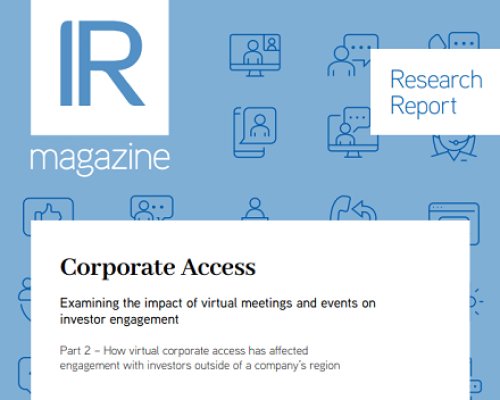Views from a UK retail sector-specific IR form hosted by Kingfisher and M&S
IROs in the retail sector soon began to miss the quarterly forums UK retail giant GUS used to host prior to its demerger in 2006. So much so, in fact, that Sarah Gerrand, head of IR at Kingfisher, and Majda Rainer, IRO at Marks & Spencer, decided it was high time they revived the sector-specific discussions that had lain dormant for the past year or so.
After the IR retail forum’s successful comeback at the end of 2007, IR magazine and two unsuspecting brokers were invited along to Kingfisher’s offices to brave a feisty bunch of IROs from FTSE–listed firms thrashing out some topical issues.
The brokers kick-started the debate by explaining how they can make IR easier. ‘We’ll keep you informed about who’s buying and selling shares, what’s driving the stock price and who’s winning mandates, and you can rely on us if analysts are being negative on stock,’ one of the brokers confidently told the assembled IR professionals. ‘We can provide you with day-to-day information, sort out roadshows, help you pitch messages at investor seminars and make you look good in front of your boss.’
Striking a match
The claims were met with certain resistance by some of the IROs. ‘Roadshows from brokers are biased,’ complained one IR officer, a former broker himself, who was swiftly advised to share out his roadshows between different brokers. ‘You still get better brokerage from non-corporate brokers as they have no vested interest,’ insisted another IRO.
Suggestions for new-fangled alternatives to the traditional roadshow began to fly around the room. ‘You can do reverse roadshows: be based in Frankfurt and have your investors rotate,’ said Rainer. The brokers agreed that investors are very willing to travel if they are able to see several companies at the same time. ‘Sector-specific events involving a series of one-on-ones are helpful too – some brokers are missing a trick,’ added Lisa Williams, head of IR at Debenhams.
Conversation settled on Kleinwort’s ‘speed dating’ process, which several IR professionals in the room had already signed up to. The day-long event involves IROs spending 20 minutes with each investor. The speed dating concept has spread to the US from the UK and is now taking off in continental Europe. A skeptic pointed out that Kleinwort writes up the event, so you don’t know whether it’s true or not, but the idea is still innovative and fun.
Rainer then asked how broking and analyst research should fit together. The brokers’ response was that their relationship with analysts is becoming increasingly difficult to manage because of all the rules and regulations in place. ‘Problems are tackled more delicately than previously, and we have less influence on analysts,’ one of the brokers said. ‘All calls with analysts have to be logged and the legal department needs to be notified each time.’
Sticking to the same theme, the IRO at an electrical conglomerate warned about the dangers of companies using internal analysts. ‘They have an unfair advantage as far as issuing notes is concerned because they know the situation better,’ he pointed out. ‘If you’re looking to change corporate broking, you should start with the analysts.’
The changing role of brokers was also put under IR examination. ‘Brokers are more about policing than advising clients now,’ one corporate complained. ‘The clock is ticking as soon as you talk to the broker, so we’d rather keep things to ourselves.’ The brokers admitted they are under increasing pressure from the Financial Services Authority, the UK’s regulatory body, to keep watch on their clients, and this air of caution probably gets fed back to the client.Dramatic denouement
Discussions then took an unexpected twist, much to the alarm of the brokers. ‘The corporate broking model needs to move on fast; it’s become more commoditized and no longer involves big fees,’ began the former broker, who had only recently converted to IR.
‘It will be interesting to see if PR, which has previously avoided treading on brokers’ toes, moves into the broking sphere to offer a more advisory role,’ said an IRO from a major UK clothing store.
‘But they would charge money,’ protested one of the brokers. ‘So might brokers one day,’ the IRO quickly retorted.
‘What do you get out of broking?’ the former broker asked the bemused brokers. ‘The relationships – something might happen,’ one of them faltered. ‘So why don’t you pay us, then? We’re the seller, we have the commodity,’ the IRO said. The reply, ‘It’d be a loss leader; Rio Tinto did nothing for years,’ fell on deaf ears.
The corporates were too busy working out the extra revenues they could gain by billing brokers for roadshows and services. ‘We could also charge the sell side for each meeting. If we weren’t there, there’d be nothing to write about!’ interjected an optimistic IRO.
Most issues addressed at the forum are faced by all IROs, yet those in retail made it clear their sector is unique, notably owing to the high volume of customer-shareholders. Debenhams’ IR department, for example, is situated in the group’s flagship store off London’s busy Oxford Street, lending itself to unexpected visits from shareholding shoppers.
It’s a dilemma other IROs in this sector can relate to, even if their wider concerns are felt by IR departments everywhere.










